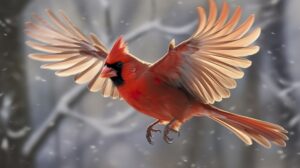Posted by Roberta Grimes • February 08, 2025 • 15 Comments
Quantum Physics, Understanding Reality
… He can turn the tides and calm the angry sea.
He alone decides who writes a symphony.
He lights every star that makes the darkness bright.
He keeps watch all through each long and lonely night.
He still finds the time to hear a child’s first prayer.
Saint or sinner calls and always finds Him there.
Though it makes Him sad to see the way we live,
He’ll always say, “I forgive”
– Richard Mullan & Jack Richards, from “He” (1969)
 What you and I experience as conscious awareness is in fact all that exists. In all things and in every aspect of reality, consciousness is everything. Consciousness is both the sculptor and the clay. Or, as my darling Thomas so well put it to me, long before I could have understood who that tall stranger in the long blue robe who spoke to me and taught me in the empty lot beside my childhood home actually was: everything there is or there ever can be is part of a thought in the mind of God. Thomas taught me that there never has been and there never can be anything else.
What you and I experience as conscious awareness is in fact all that exists. In all things and in every aspect of reality, consciousness is everything. Consciousness is both the sculptor and the clay. Or, as my darling Thomas so well put it to me, long before I could have understood who that tall stranger in the long blue robe who spoke to me and taught me in the empty lot beside my childhood home actually was: everything there is or there ever can be is part of a thought in the mind of God. Thomas taught me that there never has been and there never can be anything else.
 The fact that consciousness is all there is was first discovered by the earliest quantum physicists around the turn of the twentieth century. And it was a major reason why mainstream science so resolutely drove itself off the rails into materialist atheism at about the same time, in what the scientific community imagined was its own defense. I first discovered this crisis of science just in passing, as I was browsing in used-book stores, reading popular-science magazines, and discovering so much wonderful turn-of-the-twentieth-century afterlife evidence. It is easy to see why Max Planck, who won the 1918 Nobel Prize in Physics as the father of quantum mechanics, must have panicked the whole field of Newtonian physics when he began to go public with his discoveries! If you have not yet done it, you ought to read the ultimate quantum-physics-for-dummies book, Quantum Enigma by Bruce Rosenblum and Fred Kuttner. Quantum physics makes sense, and their book will help you to understand why it is so easy and sensible for consciousness to be all that exists. But our great friend Max Planck really did a number on Newtonian physicists when in 1931 he said, “I regard consciousness as fundamental. I regard matter as derivative from consciousness. We cannot get behind consciousness! Everything that we talk about, everything that we regard as existing, postulates consciousness.”
The fact that consciousness is all there is was first discovered by the earliest quantum physicists around the turn of the twentieth century. And it was a major reason why mainstream science so resolutely drove itself off the rails into materialist atheism at about the same time, in what the scientific community imagined was its own defense. I first discovered this crisis of science just in passing, as I was browsing in used-book stores, reading popular-science magazines, and discovering so much wonderful turn-of-the-twentieth-century afterlife evidence. It is easy to see why Max Planck, who won the 1918 Nobel Prize in Physics as the father of quantum mechanics, must have panicked the whole field of Newtonian physics when he began to go public with his discoveries! If you have not yet done it, you ought to read the ultimate quantum-physics-for-dummies book, Quantum Enigma by Bruce Rosenblum and Fred Kuttner. Quantum physics makes sense, and their book will help you to understand why it is so easy and sensible for consciousness to be all that exists. But our great friend Max Planck really did a number on Newtonian physicists when in 1931 he said, “I regard consciousness as fundamental. I regard matter as derivative from consciousness. We cannot get behind consciousness! Everything that we talk about, everything that we regard as existing, postulates consciousness.”
Wow, that was pretty definitive, was it not? By then, the mainstream scientific gatekeepers understood that what they truly were protecting their precious against was the possibility that some scientist might inadvertently claim to have found the God of the Christians and the Jews. So they clamped down on enforcing their materialist/atheist dogma ever more strictly as the twentieth century wore on.
 And, sure enough, Max Planck at last did indeed come to understand the ever deeper implications of what he had found. In 1944 he said, “As a man who has devoted his whole life to the most clear-headed science, to the study of matter, I can tell you as a result of my research about atoms this much: There is no matter as such. All matter originates and exists only by virtue of a force which brings the particle of an atom to vibration and holds this most minute solar system of the atom together. We must assume behind this force the existence of a conscious and intelligent mind. This mind is the matrix of all matter.” Bingo! God had at last been found. So then, how far does this penetration of consciousness go? What about animals? Are they conscious as well? Of course they are. Even the birds at the feeder outside my window will look in through the glass and cock their heads at me with what clearly is awareness. That has to be true of animals and birds, when it is true even of plants!
And, sure enough, Max Planck at last did indeed come to understand the ever deeper implications of what he had found. In 1944 he said, “As a man who has devoted his whole life to the most clear-headed science, to the study of matter, I can tell you as a result of my research about atoms this much: There is no matter as such. All matter originates and exists only by virtue of a force which brings the particle of an atom to vibration and holds this most minute solar system of the atom together. We must assume behind this force the existence of a conscious and intelligent mind. This mind is the matrix of all matter.” Bingo! God had at last been found. So then, how far does this penetration of consciousness go? What about animals? Are they conscious as well? Of course they are. Even the birds at the feeder outside my window will look in through the glass and cock their heads at me with what clearly is awareness. That has to be true of animals and birds, when it is true even of plants!
 The most transformational book that I ever have read is The Secret Life of Plants by Peter Tompkins and Christopher Bird. I first read that amazing book in 1973, its year of first publication, and I didn’t realize until years later the way that book had helped to form a basis for my fifty years of afterlife research. And it primed me to accept the evidence that what we experience as human conscious awareness truly is universal among all living things! The fact that such a seminal masterwork which is so fundamental to our understanding of life has been so steadfastly ignored by mainstream scientists because it doesn’t fit their predetermined materialist/atheist narrative was my first clue that the mainstream scientific emperor is sadly altogether naked. And that scientific emperor appears now likely to remain resolutely naked, not only for the rest of your life and mine, but perhaps naked even for our children’s and our grandchildren’s lifetimes as well.
The most transformational book that I ever have read is The Secret Life of Plants by Peter Tompkins and Christopher Bird. I first read that amazing book in 1973, its year of first publication, and I didn’t realize until years later the way that book had helped to form a basis for my fifty years of afterlife research. And it primed me to accept the evidence that what we experience as human conscious awareness truly is universal among all living things! The fact that such a seminal masterwork which is so fundamental to our understanding of life has been so steadfastly ignored by mainstream scientists because it doesn’t fit their predetermined materialist/atheist narrative was my first clue that the mainstream scientific emperor is sadly altogether naked. And that scientific emperor appears now likely to remain resolutely naked, not only for the rest of your life and mine, but perhaps naked even for our children’s and our grandchildren’s lifetimes as well.
 The Tompkins and Bird book’s fundamental insight is that plants are conscious, they mentally communicate with one another, and they also mentally communicate with us. And what an amazing revelation that is! Consider only the work of Cleve Backster, who in the nineteen-sixties was one of America’s leading experts on lie detectors. One morning in 1966, Mr. Backster decided on a whim to use his office plant as an experimental subject. He attached a galvanometer to one of its leaves. And, what do you know? He found that the plant in his office was reacting very much as a person would react as it sat there contentedly in its pot having its transient and amazingly human-like thoughts. Backster soon found that the most extreme reactions in his plant were produced when he decided to burn one of its leaves. Its frantic reaction was less if Backster only imagined burning the leaf, without actually intending to do the plant harm. His plant would react, too, if other living things in the room were mentally threatened with harm. And Backster and other researchers later demonstrated that these strong reactions are present even in living fragments of plants. My goodness, plants can read the minds of their own particular keepers even from a distance of miles away! There is so much more to Backster’s work that mainstream science still ignores. These amazing discoveries are now nearly sixty years old, and they are all by themselves sufficient reason for you to pick up and read one of the most amazing and most unjustly ignored books in human history.
The Tompkins and Bird book’s fundamental insight is that plants are conscious, they mentally communicate with one another, and they also mentally communicate with us. And what an amazing revelation that is! Consider only the work of Cleve Backster, who in the nineteen-sixties was one of America’s leading experts on lie detectors. One morning in 1966, Mr. Backster decided on a whim to use his office plant as an experimental subject. He attached a galvanometer to one of its leaves. And, what do you know? He found that the plant in his office was reacting very much as a person would react as it sat there contentedly in its pot having its transient and amazingly human-like thoughts. Backster soon found that the most extreme reactions in his plant were produced when he decided to burn one of its leaves. Its frantic reaction was less if Backster only imagined burning the leaf, without actually intending to do the plant harm. His plant would react, too, if other living things in the room were mentally threatened with harm. And Backster and other researchers later demonstrated that these strong reactions are present even in living fragments of plants. My goodness, plants can read the minds of their own particular keepers even from a distance of miles away! There is so much more to Backster’s work that mainstream science still ignores. These amazing discoveries are now nearly sixty years old, and they are all by themselves sufficient reason for you to pick up and read one of the most amazing and most unjustly ignored books in human history.
Here is an astonishing video that gives you some sense of just how sensitive and mutually cooperative, and even how oddly aware and almost human-like plants actually are as they work and live together in their wild communities, right there in our own backyards. Please do take the time to watch this video, since I cannot do it justice. I only can tell you that after you have watched it, you will forever after see each patch of forest as a thriving community of sentient individuals in communication with one another, sharing their resources and caring for their young. You will never look at any plant of any size in the same way again.
 I spend my days working on my laptop computer in a big bow window as part of a mutually supportive community that consists mostly of houseplants, both large and small. Of course, this way of life is healthy for all of us. Plants exhale oxygen and they breathe in carbon dioxide, while people do the reverse; and it has lately been shown that plants also help to improve indoor air quality in tightly-constructed modern homes. And surprisingly, these plants in my mixed person-plant community actually miss me when I am gone! I practice business law in Massachusetts, and I travel to see my clients for a week at a time several times a year. I leave my plants well-watered; but still, no one comes into my office for that week, so, depend on it: some of the smaller plants will drop a leaf or two whenever I am away. Is that loneliness? Or is it worry? Should I ask my human family to come in here every so often and talk to the plants while I am gone?
I spend my days working on my laptop computer in a big bow window as part of a mutually supportive community that consists mostly of houseplants, both large and small. Of course, this way of life is healthy for all of us. Plants exhale oxygen and they breathe in carbon dioxide, while people do the reverse; and it has lately been shown that plants also help to improve indoor air quality in tightly-constructed modern homes. And surprisingly, these plants in my mixed person-plant community actually miss me when I am gone! I practice business law in Massachusetts, and I travel to see my clients for a week at a time several times a year. I leave my plants well-watered; but still, no one comes into my office for that week, so, depend on it: some of the smaller plants will drop a leaf or two whenever I am away. Is that loneliness? Or is it worry? Should I ask my human family to come in here every so often and talk to the plants while I am gone?
 Oh yes, what we experience as consciousness is the base creative force (there are five great Hillfaith videos at the link). Consciousness is all that objectively exists, which means that it should not really surprise us to find that every living thing is in some way conscious. And in fact, that may also be true of even what we consider to be some non-living things. If Consciousness is the base creative force and all that exists, then perhaps even things like rocks might also be in some way conscious, too? One of the things that we generally do when we first return to our eternal home is to go sightseeing, and often on random distant planets. After all, there is neither time nor distance in our eternal home, so we can easily travel to very far away places. I recall long ago reading an account by someone who had been enjoying doing his post-death touring, and he talked about having visited a planet where the life was not carbon-based, but instead it was silica–based. That entire planet teemed with life! But you didn’t realize at first that anything on the planet that he was visiting was alive, because it all moved so ve-e-e-ry sl-o-o-wly. And, you know, come to think of it now, the rocks all around us on planet earth are moving ve-e-e-ery sloo-o-owly too-o-o….
Oh yes, what we experience as consciousness is the base creative force (there are five great Hillfaith videos at the link). Consciousness is all that objectively exists, which means that it should not really surprise us to find that every living thing is in some way conscious. And in fact, that may also be true of even what we consider to be some non-living things. If Consciousness is the base creative force and all that exists, then perhaps even things like rocks might also be in some way conscious, too? One of the things that we generally do when we first return to our eternal home is to go sightseeing, and often on random distant planets. After all, there is neither time nor distance in our eternal home, so we can easily travel to very far away places. I recall long ago reading an account by someone who had been enjoying doing his post-death touring, and he talked about having visited a planet where the life was not carbon-based, but instead it was silica–based. That entire planet teemed with life! But you didn’t realize at first that anything on the planet that he was visiting was alive, because it all moved so ve-e-e-ry sl-o-o-wly. And, you know, come to think of it now, the rocks all around us on planet earth are moving ve-e-e-ery sloo-o-owly too-o-o….
When we fully understand that Consciousness is both the sculptor and the clay, and truly nothing else exists, it does not surprise us at all to learn that life is a core attribute of consciousness. It is difficult to fully understand everything that this most fundamental sentence of all Apex sentences in this post actually means, although, wow, we are coming to realize more and more completely some of what it means. Even the bit that we can see is boggling!
 I have been an eager science hobbyist for most of my life. So I can tell you with confidence that all through the latter part of the twentieth century and the early part of the twenty-first, traditional scientists have been sure that they were just about to figure out how life began. The theory on which most bets have been placed has long been that lightning must have hit just the right random mix of chemicals in some primordial pool, and Presto! We had life. So they would try to replicate this or that mix of chemicals and then zap it in their laboratories. But the problem with solving this most difficult of all scientific problems was figuring out how that spark of life, even if it might have begun this way, could have maintained itself for long enough to have randomly evolved over time a self-sustaining living cell with all that cell’s necessary components. Those popular-science magazine articles of late are less common and not nearly so hopeful.
I have been an eager science hobbyist for most of my life. So I can tell you with confidence that all through the latter part of the twentieth century and the early part of the twenty-first, traditional scientists have been sure that they were just about to figure out how life began. The theory on which most bets have been placed has long been that lightning must have hit just the right random mix of chemicals in some primordial pool, and Presto! We had life. So they would try to replicate this or that mix of chemicals and then zap it in their laboratories. But the problem with solving this most difficult of all scientific problems was figuring out how that spark of life, even if it might have begun this way, could have maintained itself for long enough to have randomly evolved over time a self-sustaining living cell with all that cell’s necessary components. Those popular-science magazine articles of late are less common and not nearly so hopeful.
 My dear ones, those materialist/atheist scientists’ primary problem lies in the fact that they long ago turned what should have been an open field of unrestricted inquiry into just one more closed-minded, dogma-driven religion. And what good is that to anyone? They still even today are forcing working scientists to spend effort trying to find a source of consciousness inside the human brain, where of course no such thing ever will be found. Scientists remain stuck with their foolish “fundamental materialist dogma,” even a hundred and twenty years after a few panicked gatekeepers first adopted it as a stopgap measure to try to protect quantum physicists from finding the religionists’ God. So even more than a century later they still are forced to come up with endless arbitrary nonsense. Like, for example, a “Big Bang” of something from nothing as their explanation for the origin of reality, even though of course any reasonably intelligent twelve-year-old child can simply ask, “So, what came before that?” And the scientists are undone. That child’s question is one that no scientist can honestly answer. Scientists are going to have to give up their artificial materialist/atheist dogma eventually, whether it’s now or another thousand years from now! And from now until they eventually do give it up, every bit of the science that they claim to be doing in the interim will be severely tainted by the fact that their dogma always insists that they get “One free miracle; then we’ll explain the rest.” This is true of the Big Bang, and of most other areas of inquiry as well. Frustrated materialist scientists still are forced to defend the nonsensical proposition that all of reality is just an ephemeral nothing.
My dear ones, those materialist/atheist scientists’ primary problem lies in the fact that they long ago turned what should have been an open field of unrestricted inquiry into just one more closed-minded, dogma-driven religion. And what good is that to anyone? They still even today are forcing working scientists to spend effort trying to find a source of consciousness inside the human brain, where of course no such thing ever will be found. Scientists remain stuck with their foolish “fundamental materialist dogma,” even a hundred and twenty years after a few panicked gatekeepers first adopted it as a stopgap measure to try to protect quantum physicists from finding the religionists’ God. So even more than a century later they still are forced to come up with endless arbitrary nonsense. Like, for example, a “Big Bang” of something from nothing as their explanation for the origin of reality, even though of course any reasonably intelligent twelve-year-old child can simply ask, “So, what came before that?” And the scientists are undone. That child’s question is one that no scientist can honestly answer. Scientists are going to have to give up their artificial materialist/atheist dogma eventually, whether it’s now or another thousand years from now! And from now until they eventually do give it up, every bit of the science that they claim to be doing in the interim will be severely tainted by the fact that their dogma always insists that they get “One free miracle; then we’ll explain the rest.” This is true of the Big Bang, and of most other areas of inquiry as well. Frustrated materialist scientists still are forced to defend the nonsensical proposition that all of reality is just an ephemeral nothing.
Consciousness is all that exists. And since consciousness is both timeless and eternal, and life is a fundamental property of consciousness, once mainstream science as a discipline stops adhering to its silliness of materialist/atheism, and it frees all scientific researchers to at last do open-minded scientific research, then in very short order the answers to every question that they even now still have to fudge will be honestly found. In non-time and non-space, all reality lies in the simple underlying certainty that consciousness truly is all!
… He can grant a wish or make a dream come true.
He can paint the clouds and turn to gray the blue.
He alone is there to find a rainbow’s end.
He alone can see what lies beyond the bend.
He can touch a tree and turn the leaves to gold!
He knows every lie that you and I have told!
Though it makes Him sad to see the way we live,
He’ll always say, “I forgive.”
– Richard Mullan & Jack Richards, from “He” (1969)
(Many photos are from Vecteezy.com)
That linked video
https://www.youtube.com/watch?v=ifpVfRaK_pI&t=584s
is simply AMAZING!
Thanks for posting it!!!!
Oh my very dear one, I love that video as well! And please do read the book, The Secret Life of Plants. When you finally realize how fundamentally conscious these plant-creatures really are, it changes the way that you see everything!
Dear Roberta, What you argue is astounding–but true. Beyond what Max Plank had inferred a century ago, we may apply current quantum research to demonstrate that materialism cannot possibly explain existence. In 2022 the Nobel Prize was awarded to physicists who conclusively demonstrated that quantum entanglement was factually true. Quantum entanglement was an astounding prediction from the Schrodinger wave equation that Einstein believed had to be wrong. The prediction was that particles that were created together, say by splitting a photo into two halves, would communicate with each other instantaneously across any distance, however vast, even across the entire known universe. This paper of mine ( https://near-death.com/quantum-entanglement-and-the-nde/ ) explains how–conventional materialistic physics has no explanation.
Re the creation of life, this paper show that the complexity of a single cell is so fantastically complex that it could not possibly be the product of random events ( https://www.esalq.usp.br/lepse/imgs/conteudo_thumb/The-Complexity-of-the-Cell.pdf ).
Did Chandra Wickramasinghe write the paper on the human cell? Excellent article!
My dear wonderful Adrian, that article is so terriffic and so widely shared that by now it has long since been separated from its author, I am sorry to say.
Thank you for this, my very dear wonderful Jack! It amazes me that so few people understand these very basic facts, when they are so flat-out wonderful!
Once again, Roberta, I thank you for providing the impetus for me to go exploring–this time in my backyard! Wow! What a magnificent world we live in! When I was watching the video, I was reminded of something our President said when he visited California after the horrific fires. He mentioned that in some areas he saw a home completely destroyed and the nearby trees not touched. He said it was because they were all wet! His message was about forest management–cleaning up the debris on the forest floor before it became fuel for devastating fires. Your words today seem to connect nicely. I send much love to you and Thomas for opening doors of exploration and discovery. P.S. Being a maniacal bibliophile, of course I immediately ordered the recommended book, The Secret Life of Plants!
Oh my dear Janelle, and don’t you think the parental trees, too, have done what they could to protect the young trees around them from burning? I love the way these trees in forests care for one another!
I’m currently reading “The Science of Spirituality “ and it says exactly the same thing. Science and spirit are one, thank you for your Christian perspective Roberta!
Oh my dear beautiful Bill, it truly is all one, if only our materialist scientist friends could finally come to understand that!
Roberta,
Thanks for the nice post. When I think how so many of us were force-fed materialism as a dogma I am taken aback. This is still occurring in the halls of academia because “deviation” from that paradigm is met with nothing short of excommunication from a religious order! Careers in science can be entirely derailed if a person so much as thinks that materialism may not have all the answers. The study of the origin of life is an unsatisfying endeavor using the materialist viewpoint because a point is reached where only question marks embellish the diagrams and chemical equations attempting to explain the suppositions. The statistical odds of a series of events leading to the formation of something as complex as a cell, able to survive and reproduce in a hostile environment are beyond astronomical. While I don’t claim to have answers, it would seem that Consciousness has something to do with “tipping the scale” to favor the formation of life. Assuming that “chance” by itself is responsible doesn’t pencil out.
All so wisely and wonderfully said, my dear beautiful Mark! It is so amazing that the materialists still so foolishly soldier on, even though so many of them must realize by now that they are on an endless road that goes nowhere.
Dearest Roberta,
Somewhere and fairly recently I saw a reference to the “Subconscious” This goes against my thought that the conscious was indivisble. Now I am thinking that it is partly conscious and beings can behave as if they were a part of siome larger being.
I keep thinking that if t exists the consciousness takes on the form of an appropriate dimension Fourier Transform and can take on the approriate transform.
I am certain that one of the more mathematical members of this blog could easily spot the flaws in this construct.
Yours, Cookie
Oh no, my dear Cookie, of course not! Your “subconscious” is simply aspects of your mind that exist beneath your active, conscious awareness. It holds older and less accessible memories, and it affects your thinking in ways of which you may not be fully aware, but sometimes good therapy can dredge it out.
Dearest Roberta,
Thank you for the timely response which really intrigued me. I was especially intrigued by “thinking in ways of which you/I may not be fully aware” At least I would be partially aware so I could self censor so as to avoid too much embarrrassment at random times. Since I haven’t encountered that phenomenon very often, may I assume that I didn’t carry over much of my original subcincious?
Yous, Cookie